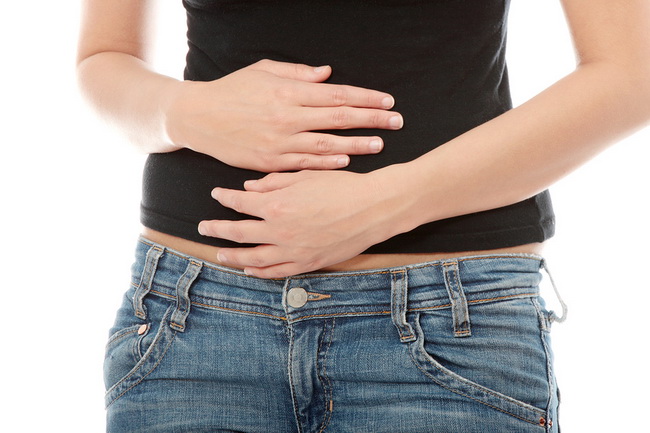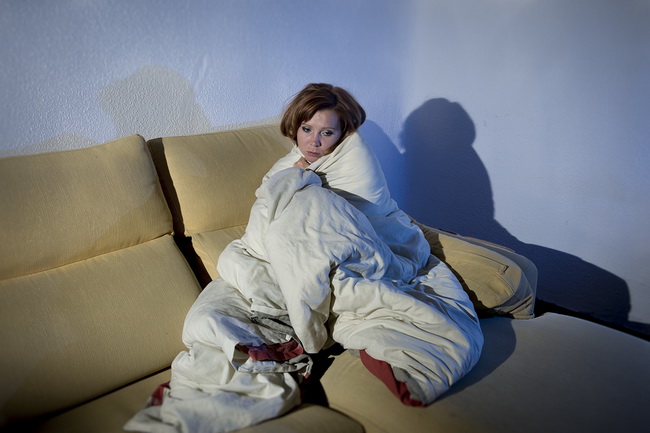- Make It Yourself Lavender Heart-Shaped Bath Bombs!
- 20 Things You Never Knew About “Down There”
- 12 Best Foods For Those Suffering From Arthritis Pain
- 12 Personal Hygiene Mistakes Almost Everyone Makes (Mom Never Told You About #4!)
- 15 Medicinal Plants And Herbs From The Cherokee People
- 12 Mind-Blowing Benefits Of Drinking Coconut Water During Pregnancy
- 12 Outstanding Winter Foods That Won’t Fatten You Up Like A Christmas Turkey
15 Signs You Have A Hormonal Imbalance And Are NOT Going Crazy!

Photo credit: bigstock.com
Ladies, have you ever felt like just maybe you were going a bit crazy? You know what we are talking about: When you suddenly become angry, for little or no reason, then break down and cry a minute later. Or sometimes cry for no reason at all? Or those nights when you can’t sleep because you are hot but the house is only 52 degrees? You’re crabby and sad and hot and can’t think straight and someday you can’t help but wonder … Am I going crazy?
We often blame our hormones, and there is good reason for that. Hormones play a huge part in a woman’s life. They control our menstrual cycle, pregnancy, and fertility. However, when our hormones are out of balance, they can make us feel a bit crazy by affecting our mood, sexual desire, and sleep patterns.
Hormone problems can be quite common, so if you believe you might be having an imbalance you are certainly not alone. Certain things can easily throw out bodies out of whack: pregnancy, the Pill, menopause, menstrual problems, even lifestyle factors. Sometimes there are other causes such as a thyroid problem or diabetes.
Are you feeling out of control and a little bit crazy, but don’t know if it’s hormones or not? Keep reading for the most common 15 signs that your hormones are out of balance so you can relax and not worry so much about your mental health.
1. You Crave Sugar All the Time
If you suddenly find that you are craving sugar all the time, this is a common sign of a hormonal imbalance. Sometimes it is caused by the thyroid gland, but adrenal overload can also cause this condition. You should check with your doctor if your sugar cravings are out of control.
2. Sleep Problems
Some women find it difficult to fall asleep a few days before their period starts. This is most likely due to the sharp drop in progesterone that occurs just before menstruation. Progesterone levels also drop after giving birth, but your new baby wouldn’t let you sleep anyway. Progesterone is a relaxing hormone, so when your body is low on it, it can make you feel restless. Many menopausal women find it difficult to stay asleep, lots of times because they wake up with night sweats. Try drinking some chamomile tea to relax your body before bed.
3. Hair Loss
You might think that you are ripping your hair out because of your kids or your job, but when your testosterone levels dip (and women have very little testosterone to begin with), it’s enough to cause dyhydrotestosterone, or DHT, which can trigger hair loss. This also happens to many men as they age. If you are losing more hair than you believe is normal, have your doctor test your hormone levels.
Continue to Page 2

Photo credit: bigstock.com
4. Persistent Acne
Many women get acne breakouts just before their period due to a shift in hormones. If you find that you are getting breakouts of cystic acne frequently, then the real culprit could be the male hormone androgens. Testosterone stimulates the excess production of oil, which becomes trapped under the skin, then mixes with the bacteria that causes acne, leading to clogged up pores and zits galore. The higher your testosterone level, the worse the acne. You can try using coconut oil on your face each night to help stop the bacteria that cause acne, or try any of the herbs that are known to help fight acne.
5. Loss of Sexual Desire
This frequently happens to women with hormonal imbalances, often due to a lack of estrogen. This one can be fixed by seeing your doctor who can prescribe a vaginal estrogen cream or a patch. You can also try eating more foods that simulate estrogen, such as soy.
6. Brain Fog
Does it suddenly seem as if you are forgetting everything? Where you left your keys, your purse, your mother-in-law. Ok, maybe you aren’t so worried about the last one, but this doesn’t mean you are getting Alzheimer’s. More than likely, it simply means that you have been under a great deal of stress, and your body is making larger amounts of a stress hormone called cortisol. Studies have shown that high levels of cortisol can interfere with short term memory and learning abilities. Find natural ways to de-stress such as yoga and meditation.
Continue to Page 3

Photo credit: bigstock.com
7. Changes in Your Breast
As women become older, high levels of estrogen can make the breasts feel sore and tender even to the slightest touch. Unfortunately, this can also lead to cysts, fibroids, and other lumps. Get to know your own breasts by examining them regularly. This way, you will know if something new crops up or if there are any changes. If you should notice any type of change in your breasts or nipples, see a doctor right away. Chances are it’s nothing serious; however, your best chance of surviving breast cancer is early diagnosis.
8. You Are Always Hungry
Can’t keep yourself away from the fridge? Stop telling yourself that you are a fat pig and take a look at the real reason fueling your hunger: hormones. If you are not getting enough sleep, your levels of a hormone called ghrelin tend to get sky high, which will make you super hungry. Ghrelin stimulates the appetite. People who are chronically sleep deprived tend to gain weight more easily than those who get at least seven hours of sleep each night.
9. Vaginal Dryness
As women enter menopause, the reduction in estrogen levels can cause changes to the vaginal walls. This means dryness, making sex downright uncomfortable. There are plenty of lubricants available to help ease discomfort, but if those don’t work, talk to your doctor about other options such as testosterone creams or intravaginal low-dose estrogen creams.
Continue to Page 4

Photo credit: bigstock.com
10. Digestive Problems
Stress hormones affect people in different ways. Some people keep their stress in their heads and get tension or migraine headaches. Other people get cranky and just want to lose themselves in a box of donuts. Some people feel stress in their stomachs. Cortisol production is highest in the early morning hours to help you wake up and get going. Those who overwork their adrenal glands to the point of exhaustion might find that they simply can’t get going in the mornings. They also suffer from digestive problems such as IBS and chronic diarrhea or constipation. Sometimes the flux between estrogen and progesterone can also play a part.
11. Night Sweats and/or Hot Flashes
If you frequently experience those “tropical holidays” at night, this is most likely due to a hormonal imbalance. Night sweats and hot flashes are usually due to high estrogen levels and too little progesterone. Women are more prone to these temperature fluctuations as they go through menopause. Many women find relief from these annoying symptoms by taking black cohosh, evening primrose oil, or alfalfa tablets.
12. Constantly Feeling Fatigued
We all have those days when we are just wiped out by our responsibilities and need a good nap. But if you feel exhausted every single day, even after sleeping well at night, sometimes even after taking a nap, then you might be suffering from the lack of proper thyroid hormones, something called hypothyroidism. This might be especially true if you have recently gained 10 to 30 pounds, and you don’t seem able to drop the weight even after exercising and dieting. The hormones of the thyroid gland control a great deal of our metabolism, and when those hormone levels are low, all systems are slow.
Continue to Page 5

Photo credit: bigstock.com
13. Headaches and Migraines
As women approach middle age, it is not uncommon for them to find they suffer from headaches and even migraines more frequently. This can be because of hormonal imbalances during the menstrual cycle. If you suffer from headaches or migraines, it might help you if keep a diary of when they happen. You might find out that they follow certain dates, times, or triggers.
14. Mood Swings/Depression/Anger
Most women find that as they approach their middle years and hit menopause, they experience wild mood swings and anxiety attacks, even feeling nervous about handling situations that used to be normal for them. This is due to hormonal imbalances in most cases, which often occur during menopause. Many women find that they become angry quicker than they did before, they cry at the drop of a hat, and frequently become depressed. If you suffer from mild to moderate mood swings, try one of the many herbal supplements that can help you to manage these feelings. If you feel severe depression or your mood swings are interfering with your life, see your doctor.
SEE ALSO: 15 Signs You Are Having Thyroid Problems (#9 is Really Surprising!)
15. Weight Gain
Many women find that the older they become, the more weight they put on. In fact, most women simply resign themselves to their “middle age spread” because they feel there is nothing they can do about it. However, the real reason many women gain weight is because their adrenal system becomes fatigued by overwork, so it signals to the thyroid that there is a problem. Their thyroid responds by slowing down. The pancreas will respond to a slower metabolism by thinking it should protect the body by storing fat. If you have gained weight easily, and it doesn’t seem to budge, see your doctor so they can test your thyroid and adrenal gland function.
Continue to Page 6

Photo credit: bigstock.com
If you would like to try to balance your hormones naturally through diet, we have a juice recipe that can help you do just that. Yams and turmeric are known for being able to balance hormones for many women.
Helpful Hormone Balancing Juice
Ingredients:
- 1 medium-sized organic yam (about 2 cups)
- 2-inch piece of fresh, organic turmeric root
- 1 organic lemon, peeled and seeds removed
- 1 medium-sized organic cucumber
- 4 large organic celery stalks
- 3 large organic carrots
Put all of the above ingredients in your juicer. Drink this throughout the day or drink half now and put the remainder in the refrigerator to drink in the evening. Consume this drink every day until your symptoms start to subside. Balancing your hormones includes managing and reducing stress as well as consuming a natural, mostly plant-based diet. If you find you can’t get relief from your symptoms, see your doctor.
References:

































